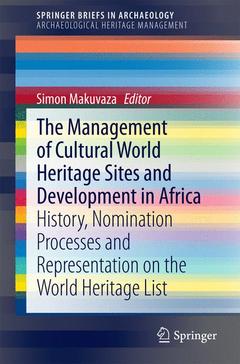Description
The Management Of Cultural World Heritage Sites and Development In Africa, 2014
History, nomination processes and representation on the World Heritage List
SpringerBriefs in Archaeological Heritage Management Series
Coordinator: Makuvaza Simon
Language: English
106 p. · 15.5x23.5 cm · Paperback
Description
/li>Contents
/li>Biography
/li>Comment
/li>
Simon Makuvazais currently reading for a PhD in Archaeological Heritage Management as an external student at Leiden University in Netherlands. He is also a Research Fellow in the Faculty of the Built Environment at the National University of Science and Technology in Bulawayo, Zimbabwe. Previously, he lectured in Archaeology and Heritage Management at the Catholic University of Malawi in Limbe. Earlier to that he had worked for the National Museums and Monuments of Zimbabwe as a Curator of Archaeology from 1997 to 2010. His research interests are local indigenous communities and the management of cultural heritage sites, cultural heritage and development, conservation and the management of World Heritage Sites with an objective of finding sustainable solutions to public heritage related management problems in contested heritage settings.
Re-evaluates the nomination and management of cultural World Heritage sites in Africa
Scrutinizes economic development and effects of World Heritage Sites
Authors are drawn from highly experienced academic researchers on World Heritage sites and administrators working in heritage organizations
Includes supplementary material: sn.pub/extras




